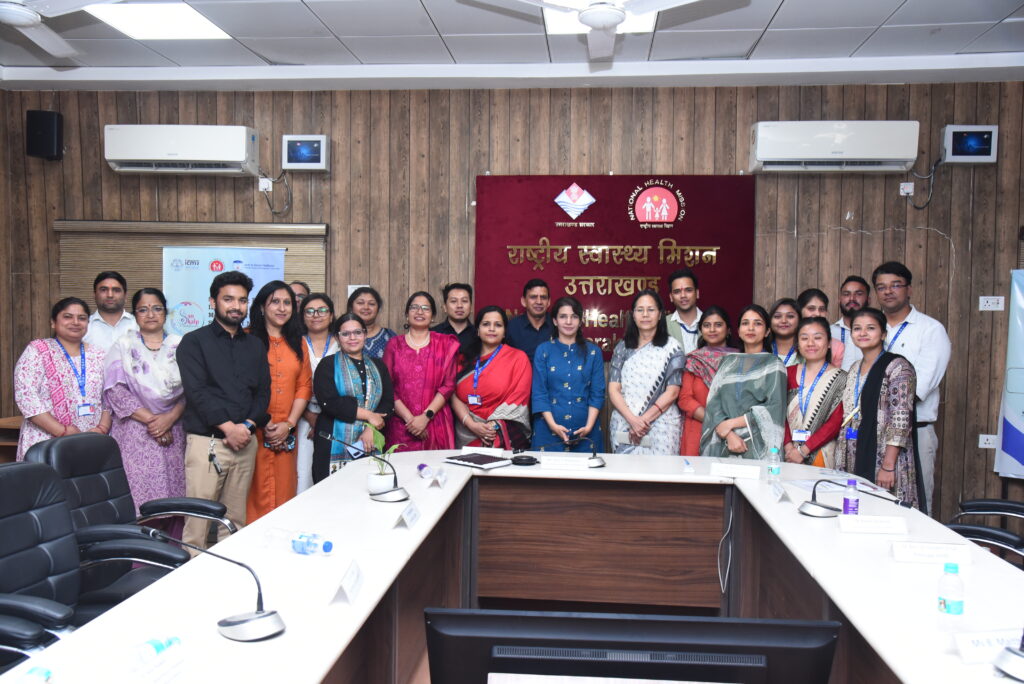On April 8, 2025, a profound wave of commitment and collaboration surged through the halls of the National Health Mission (NHM) State Office in Uttarakhand. It wasn’t just another meeting—it was the SANKALP Co-Development Workshop, a shared moment of resolve to ensure that every newborn in high-burden districts like Haridwar not only survives but thrives.
The name “SANKALP” means pledge, and that spirit of determination resonated deeply throughout the day. Co-hosted by NHM Uttarakhand and Swami Rama Himalayan University, the workshop brought together an extraordinary blend of people—policymakers, district officials, doctors, nurses, field workers, researchers, and community representatives. These weren’t just stakeholders; they were voices of experience, solution-seekers, and above all, humans bound by a common purpose—to stop the silent loss of our youngest lives.
At the heart of the workshop was a critical mission: to translate findings from the formative assessment of Haridwar’s neonatal health systems into real, tangible action. While data and policy were central, the energy in the room was driven by something more powerful—empathy. Each discussion thread was woven with lived realities: the worried mother who couldn’t reach a hospital in time, the nurse trying to resuscitate a newborn without proper equipment, the ASHA struggling to spot danger signs in remote villages with no support.
The workshop wasn’t just about listening to these stories—it was about responding to them.
Structured into five thematic focus areas—community processes, service delivery from L1 to L3 facilities, referral and transport systems, supply chain, and health data—participants rolled up their sleeves and engaged in deep, reflective group work. They mapped the system’s cracks and dreamed up bold but grounded solutions. Some challenges were familiar and heart-wrenching: a shortage of pediatricians and obstetricians, weak neonatal follow-up systems, inconsistent care practices, and an overstretched community workforce. Others—like underreported data and gaps in private sector oversight—reminded everyone that behind every number is a newborn whose journey depends on timely, quality care.
But where there were challenges, there was also resolve. Together, the participants envisioned a new way forward:
Immediate steps to equip health workers with updated skills, ready delivery rooms for emergencies, standardize resuscitation training, and use local languages in educational materials.
Medium-term strategies to strengthen infrastructure—Special Newborn Care Units, Newborn Corners, MCH wings—and ensure more specialists are available to support critical moments of care.
Community-level solutions to reinforce the roles of ASHAs and ANMs in screening, referrals, and follow-up, creating a seamless circle of care that doesn’t end at the hospital door.
The human heartbeat of the workshop was perhaps strongest during the closing session, when senior health leadership from NHM, ICMR, and the state government came together—not just to endorse the roadmap, but to own it. This wasn’t about top-down policy. It was about co-ownership, mutual accountability, and long-term partnership.
One of the most powerful takeaways was the creation of a district-specific implementation roadmap. This isn’t just a document—it’s a living, breathing strategy with built-in systems for real-time data tracking, quarterly reviews, and on-ground feedback loops. It recognizes that health systems must be adaptive, responsive, and above all, human-centered.
SANKALP, through this workshop, has reaffirmed its identity as more than a program—it’s a movement. A movement that insists on listening first, acting wisely, and staying anchored in the lived realities of mothers, babies, and frontline workers. A movement that aligns grassroots experience with global and national commitments under SDG-3: Good Health and Well-being.
As we look ahead, the path to single-digit neonatal mortality in Haridwar won’t be easy. But after the workshop on April 8, one thing is clear: we’re not walking it alone. We walk it together—with courage, compassion, and a shared sankalp to give every newborn the chance at a healthy, hopeful beginning.

